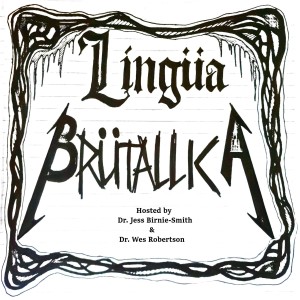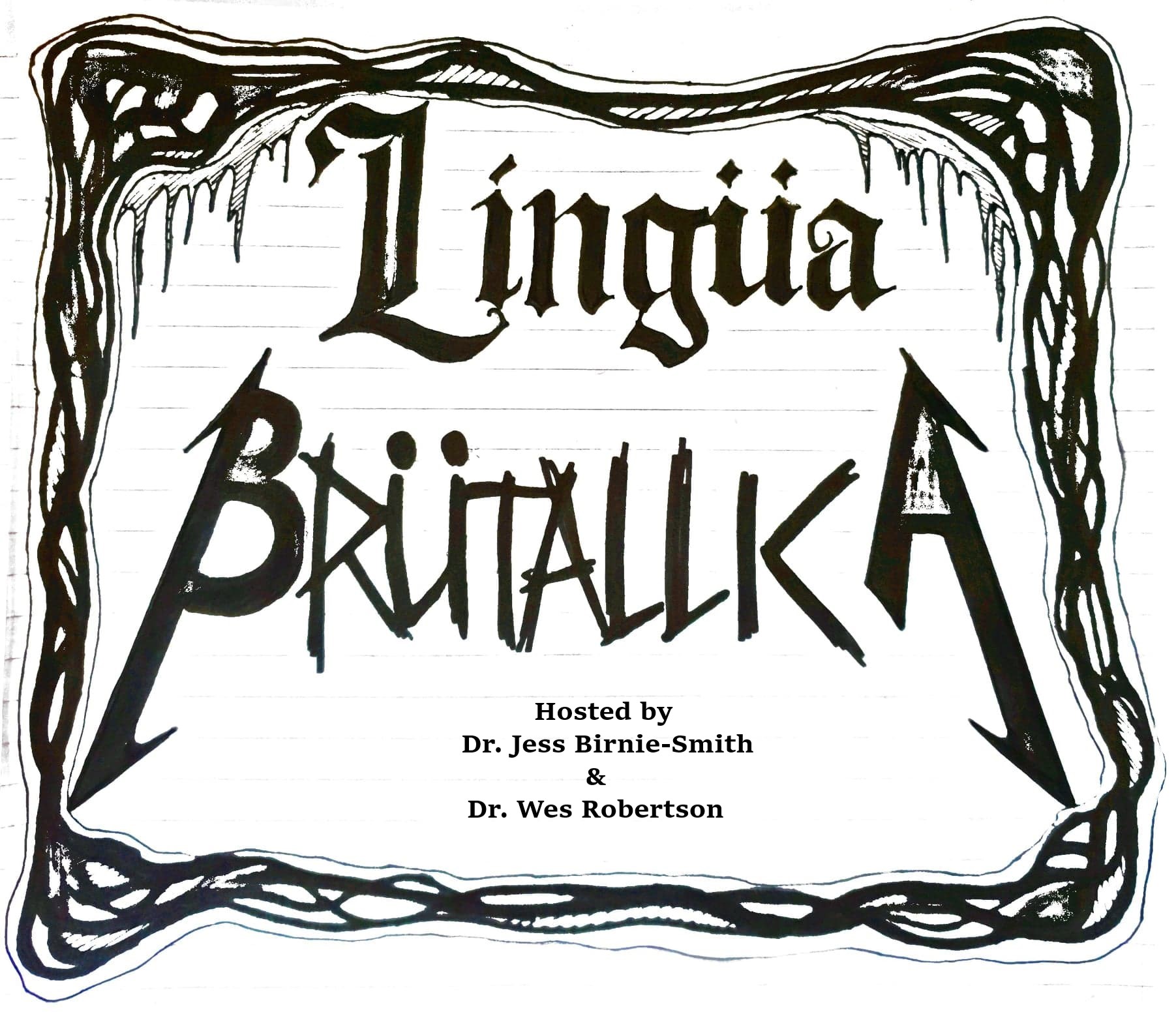Episodes

Sunday May 11, 2025
Lingüa Brütallica - Episode 67: Kelly Shaefer of Atheist (Florida, USA)
Sunday May 11, 2025
Sunday May 11, 2025
In this episode, we talk with Kelly Shaefer, legendary frontman of Atheist - pioneers of Florida death metal. With the band’s groundbreaking discography freshly reissued in 2023, Kelly takes us on a wild ride through over two decades of extreme metal lyricism—from the raw aggression of 1990’s Piece of Time to the cosmic complexity of 2010’s Jupiter. While their subject matter swings broadly from criticism of religion to reverence for the moon, what remains constant, in Kelly’s mind is how every lyric is just as important as every riff that’s in every Atheist song.
Check out Atheist's discography and keep up to date with upcoming tours here: https://atheist.bandcamp.com/

Sunday Mar 30, 2025
Sunday Mar 30, 2025
Get ready to rethink everything you think you know about extreme metal lyrics—because Dawn of Ouroboros is flipping the script. Instead of blood, chaos, and darkness, their music explores breathtaking natural beauty, the warmth of home, and the path to healing. In this episode, we dive deep with Chelsea and Tony to uncover the inspiration behind their progressive black metal lyricism. From the crushing depths of the ocean to the dazzling heights of the sky, Chelsea’s lyrics step out of the dark black metal mould, painting a world of vibrant, multicoloured light. Tune in and prepare to see metal in a whole new way.
Check out Dawn of Ouroboros here: https://dawnofouroboros.bandcamp.com/music
And sign up for updates on tour dates here: https://www.instagram.com/dawnofouroboros/?hl=en and https://www.facebook.com/dawnofouroboros/

Sunday Mar 02, 2025
Sunday Mar 02, 2025
Lingua Brutallica is BACK – and we’re kicking off 2025 with a killer episode! After a long hiatus, we’re diving straight into the brutal depths of metal lyricism with Marco Ieritano from Perth’s own death metal titans, Crypt Crawler. Marco reveals how his love of horror films, his Italian heritage, and sharp observations of human nature fuel his dark, gripping storytelling. Want to know what makes Crypt Crawler’s lyrics so hauntingly powerful? Tune in and find out!
Check out Crypt Crawler's latest work here: https://cryptcrawlermetal.bandcamp.com/
And sign up for updates on tours and releases here: https://www.instagram.com/cryptcrawlermetal/ and https://www.facebook.com/cryptcrawlermetal/

Sunday Nov 10, 2024
Sunday Nov 10, 2024
In this episode, we interview Andrew Lee about the lyrics he's written for death metal band Ripped to Shreds as well as the aptly named grindcore project Houkago Grind Time. Though their music and lyrics are clearly distinct, both of Andrew's bands can be described as a study in contrasts. First, Ripped to Shreds presents songs that convey familiar images of flayed skin, amputated limbs, and spilled viscera, alongside others that critique real-world atrocities like the rape of Nanjing and contemporary anti-Asian racism. Similarly, Houkago Grind Time, while striking a jovial tone with lyrics that affectionately mock anime fandoms, also calls attention to important issues in the anime industry, like the exploitation of freelancers. Across these seemingly diverse topics, images, and issues, runs a thread that flows from Andrew's personal experience as a Taiwanese American, metalhead, and anime fan. Consequently, Andrew continually draws on his (sub)cultural background to write lyrics that not only contextualize his music but serve as it's emotional core.
Check out Ripped to Shreds here: https://www.instagram.com/rippedtoshredsdeathmetal/
and Houkago Grind Time here: https://www.facebook.com/houkagogrindtime/

Sunday Oct 13, 2024
Sunday Oct 13, 2024
In this episode, we speak to Francesco Paoli of Italian opera metal band, Fleshgod Apocalypse. Fleshgod Apocalypse is well known for composing music that blends elements from romantic and baroque periods, inspired by composers like Bach, Vivaldi and Rossini, with the aggressive instrumentation of classic death metal. Francesco explains how this creative amalgam informs his approach to lyric-writing, drawing on features from Italian, Greek, Latin, German and English languages to call upon references to diverse literature, history, and mythology, and in doing so weave intricate narratives that reflect on existentialism and the human condition. While Francesco's compositions and influences may be varied, his writing still shows consistent patterns, such as the use of single word album titles and multi-word track titles, that tie his records together. Speaking to the significance of this practice, Francesco states simply: "we are Italian, we like tradition".
To celebrate the tradition of Fleshgod Apocalypse, go to: https://fleshgodapocalypse.bandcamp.com/

Sunday Sep 29, 2024
Lingüa Brütallica - Episode 62: Doug Moore (New York, USA)
Sunday Sep 29, 2024
Sunday Sep 29, 2024
In this episode, we talk to Doug Moore who is the lyricist for not one but five “weird” metal projects including Seputus, Glorious Depravity, Weeping Sores, Scarcity and Pyrrhon that integrate an “interdisciplinary” approach to the genre. Doug is also the writer of an article entitled “Death Metal English” for Invisible Oranges which we have frequently cited in our own academic work. Doug explains that through this work, he developed a greater appreciation for death metal English, developing a “death metal lexicon” from which he can selectively draw for lyric writing. To wit, in some of his work, Doug reproduces many of the tropes he describes, including use of -ation words, passive voice, “of the” prepositional phrases and medical jargon, while in others Doug adopts a more colloquial even conversational style rife with contractions and shortenings rarely observed in archetypal death metal English. Doug then takes us through how he deploys these different styles in different contexts, with the former approach appearing more frequently in songs depicting body horror, unpacking the fear of the body turning against you, and the latter approach appearing in lyrics critiquing social issues like the cost of living (a literal name of a song), racism, poverty, social greed, and the environmental damage we leave to our children.
To explore the gamut of Doug Moore’s work go to: https://linktr.ee/avantdumb

Sunday Sep 01, 2024
Sunday Sep 01, 2024
In this episode, we speak to Xander Bradley of “swamp death” band Slimelord. Xander explains that while Slimelord’s earlier EP’s “The Delta Death Sirens”, “Moss Contamination”, and “Insurmountable Peril” all have vocals, these vocals consist of improvised noises rather than written lyrics. And so, in preparation for the release of their first album, “Chytridiomycosis Relinquished”, Xander describes how he approached composing the band’s first set of official lyrics. Beyond simply writing lyrics, Xander constructed a whole backstory for this album focusing on the trials of an adventurer who looks to cure the world of a disease with the help of a demon-toad. This epic tale is told through both highly academic vocabulary including Latinate scientific animal genus/species names and technical jargon describing amphibian disease, as well as references to contemporary video games like Bloodborne and Elder Scrolls. These combined practices constitute lyrics that draw listeners down into the swampy depths.
To enter the swamp, go to: https://slimelord.bandcamp.com/ and https://www.instagram.com/the_slimelord/?hl=en

Sunday Aug 11, 2024
Sunday Aug 11, 2024
In this episode we are joined by Corey, Jade, and Matt, of Adelaide's premier melodic death metal outfit - Freedom of Fear. The band describe how, by drawing on fears and fantasies – of space, of vampires, of nothingness, and the impermanence of everything - their lyrics stress the power of nature vis-à-vis the insignificance of humans. To compose these lyrics, the band eschew their spoken Australian English vernacular, instead constructing a literary and archaic style, studded with old English and Latin forms, to transport listeners away from the everyday and towards their gothic fantasy realm.
Explore Freedom of Fear's gothic fantasy at: https://www.freedomoffear.com.au/; https://www.facebook.com/freedomoffearaus/ and https://www.instagram.com/freedomoffear/

Sunday Jul 21, 2024
Sunday Jul 21, 2024
In this episode, we speak to David Bruno about how he creates lyrics for fantasy-driven death metal band, Summoning the Lich. The lyrics that span two albums weave an original linear story, beginning with the creation of the Lich that sets in motion the fall of the fictional Kingdom of Rodor and the darkness that spreads across the land as the Lich’s power grows, establishing his dominion over the planet Arrias. David explains that producing these lyrics involves balancing his desire to produce both good fantasy storytelling and good metal song writing. In service of this goal, David has crafted a narrative style that draws on rhyme and alliteration, granting his story an unmistakably melodic quality. Careful observers will note a subtle transition in the bands' track titles, moving from nouns to verbs, announcing the story's growing urgency...
Listen before it's too late! https://www.summoningthelich.com/

Monday Jul 01, 2024
Monday Jul 01, 2024
In this episode, we speak to Lord Foul and Naraka about how they lure their listeners into Civerous’ dark and cavernous lyrical maze. The verbal labyrinth concocted by this aptly labelled “tomb doom” project sees listeners descend through gloomy caves where Latinate utterances echo, summoning occult rituals that pay homage to the Mexican heritage of several of Civerous’ band members. Though the caves may be supernatural, they are also familiar as the witchcraft therein evokes the terror of human suffering as well as the horror of the unknown. This latter point surmises the goal of Civerous’ lyrical composition – to arouse fear in a way that hasn’t been done before.
Enter the maze at: https://linktr.ee/civerous

